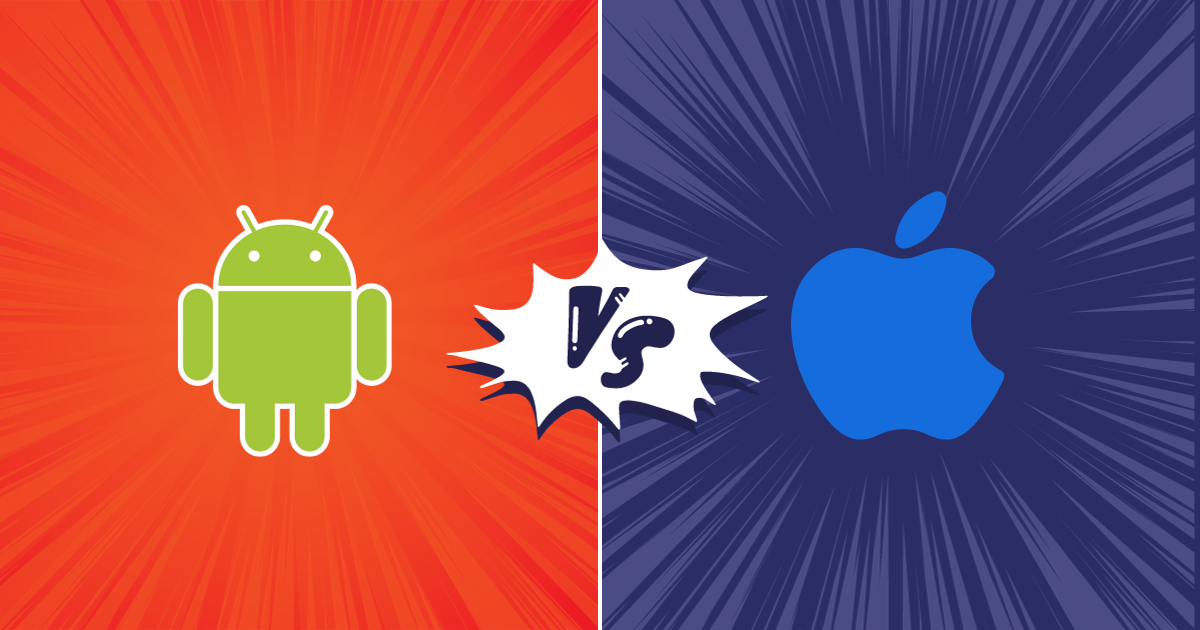Users of Android and iPhone continue to engage in a never-ending argument, fervently supporting their respective mobile operating systems. Both Android and iPhone offer unique advantages and cater to different user preferences. In this blog, we’ll dive deep into the Android vs. iPhone comparison, considering seven key factors: customization, features, apps, excitement factor, updates, ease of use, and ecosystem.
1. Customization:
Android: One of Android’s standout features is its level of customization. Android users can tweak their devices to suit their preferences with widgets, custom launchers, and an array of third-party apps. From changing the default apps to modifying system fonts and themes, Android truly offers a high degree of personalization.
iPhone: Apple has historically taken a more closed approach to customization. While iOS has come a long way in terms of personalization options, it still lags behind Android. iPhone users can customize their wallpapers, rearrange app icons, and use widgets, but it’s not as extensive as Android.
Android wins customization category
2. Features:
Android: Android devices often lead the way when it comes to hardware features. Many flagship Android phones boast innovative features like high-refresh-rate displays, expandable storage, and diverse camera systems. Android also offers advanced multitasking features, such as split-screen view and picture-in-picture mode.
iPhone: iPhones are known for their seamless integration of hardware and software. While they may not always be the first to adopt cutting-edge hardware features, Apple’s attention to detail in optimizing its features sets iPhones apart. Face ID, the A-series chips, and the ecosystem of Apple products all contribute to the iPhone’s appeal.
Android wins feature category
3. Apps:
Android: The Google Play Store offers a vast selection of apps, making it the quantity leader. Android’s open ecosystem allows developers more freedom, resulting in a wide variety of applications, including some that wouldn’t pass Apple’s strict App Store policies.
iPhone: While the App Store may have fewer apps than the Play Store, it boasts a reputation for higher-quality, curated apps. iPhone users typically have access to apps that prioritize design and user experience. Additionally, iOS apps often receive updates and new features sooner than their Android counterparts.
iPhone wins apps category
4. Excitement:
Android: The Android ecosystem is known for its diversity, with numerous manufacturers constantly releasing new devices. This diversity means Android users can always find something exciting, whether it’s a cutting-edge flagship phone or a budget-friendly option with unique features.
iPhone: Apple’s product launches are events in themselves, generating a tremendous amount of anticipation and excitement. Each new iPhone iteration often brings innovative features, design changes, and improvements that captivate Apple enthusiasts.
Android wins excitement category
5. Updates:
Android: Android updates can be inconsistent due to the fragmentation of the ecosystem. While Google’s Pixel phones receive prompt updates, other manufacturers and carriers may delay them. This can lead to a lack of uniformity in terms of security and feature updates.
iPhone: Apple’s control over both hardware and software allows for timely and consistent updates. iPhones typically receive iOS updates promptly, ensuring users have access to the latest features and security enhancements.
iPhone wins updates category
6. Ease of Use:
Android: Android’s flexibility and customization options can make it slightly more complex for new users. However, it also means that experienced users can tailor their devices to their liking, which can enhance the user experience.
iPhone: iPhones are known for their user-friendly interface. The intuitive design and straightforward settings make them an excellent choice for those who prefer a simpler, more streamlined experience.
iPhone wins ease of use category
7. Ecosystem:
Android: Android offers a broader ecosystem in terms of device variety and compatibility. You can choose from a wide range of smartphones, tablets, and even devices like smartwatches and TVs that run on Android.
iPhone: Apple’s ecosystem is known for its seamless integration. If you own other Apple devices, such as a Mac, iPad, Apple Watch, or Apple TV, the synergy between them is unparalleled. Features like AirDrop, Handoff, and iCloud make it easy to transition between Apple devices seamlessly.
iPhone wins ecosystem category
Conclusion
In the end, the choice between Android and iPhone boils down to priorities and personal preferences. While iPhone delivers a more controlled and user-friendly experience, punctuated by regular upgrades and a well knit ecosystem, Android shines in customization, a variety of hardware possibilities, and excitement.. The decision between the two should be based on what you value most in a smartphone.

